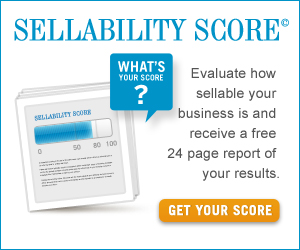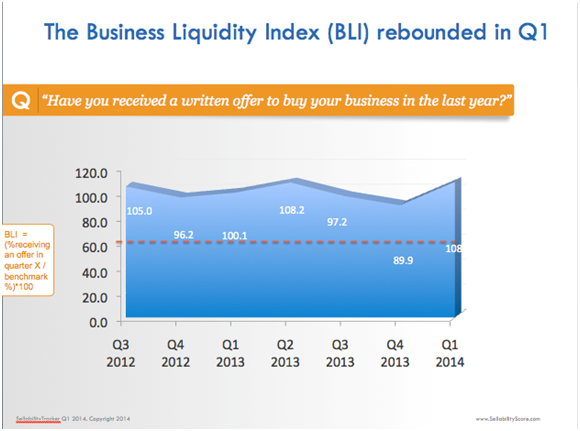Republished with permission from Built to Sell Inc.
Big public companies trade at a significant premium over small businesses in the same industry because investors perceive big, sophisticated companies as a safer bet than small, owner-dependent companies.
Let’s take a look at the professional services industry. Although most consultancies are a small collection of experts, there are also a handful of big publicly traded professional services firms. Omnicom (NYSE:OMC) is a massive marketing services company with a market capitalization of around $18 billion. For all of 2013, Omnicom reported pre-tax income of $1.66 billion, meaning they are trading at around 11 times pre-tax income.
Smaller service businesses trade at much lower multiples. We know this because at our firm we offer The Sellability Score questionnaire which asks smaller business owners (our typical user has between $1 million and $20 million in sales) if they have received an offer to buy their business, and if so, the multiple of their pre-tax profit the offer represents. When we look at the professional services segment, we find the average multiple over the last two years was 3.81—almost three times lower than Omnicom.
When we isolate professional services companies with at least $3 million in revenue, the multiple being offered goes up to 4.97 times pre-tax profit, but it is still less than half of Omnicom’s 11 times.
And in case you thought this phenomenon was unique to the marketing services vertical, take a look at the IT services giant Accenture (NYSE:ACN). Accenture reported pre-tax income of $4.3 billion in 2013 and currently has a market capitalization of more than $52 billion, meaning they are trading around 12 times pre-tax profit, which is more than double the price we see being offered to smaller professional services firms.
How To Get a Big Company Multiple For Your Business
So how do you get a public company-like multiple for your business? One approach is to look for a strategic buyer. Unlike a financial buyer that is looking for a relatively safe return on their capital invested (which is the reason investors place a premium on big, stable companies trading on the stock market), a strategic buyer will value your company on how buying you will impact them.
Let’s imagine you have a grommet business predictably churning out $500,000 in pre-tax profit. These days, a financial buyer may pay you around 4 or 5 times earnings – in this case, roughly $2.5 million – if you can make the case your profits are likely to continue well into the future.
Now let’s imagine that a company that sells a billion dollars worth of widgets starts sniffing around your grommet business. They think that if they integrate your grommets into their widgets, they can sell 10 percent more widgets next year.
Therefore, your little grommet business could add 100 million dollars of revenue for the widget maker next year – and that’s just year one after the acquisition. Imagine what your business could be worth in their hands if they continued to sell more widgets each year because of the addition of your company.
The widget maker is not going to pay you $100 million for your business, but there is somewhere between the $2.5 million a financial buyer will pay and the $100 million in sales that the widget maker stands to gain next year that is both a good deal for you and for the widget maker.
Premium multiples get paid to big companies, and also to the little ones that can figure out how to make a big company even bigger. If you’d like to know how your company performs on The Sellability Score, simply complete the 13-minute questionnaire here at www.businesssellabilityaudit.com
 For more free information on Creating A Business Owner’s Dream Financial Plan, you can listen to a free, eight part series we did exclusively for business owners. The show is also available to subscribe to for free via iTunes.
For more free information on Creating A Business Owner’s Dream Financial Plan, you can listen to a free, eight part series we did exclusively for business owners. The show is also available to subscribe to for free via iTunes.













